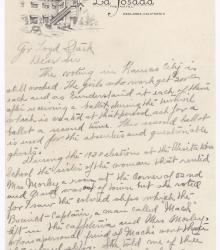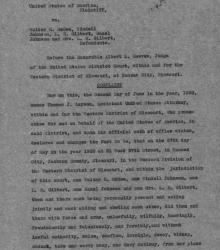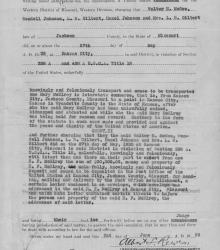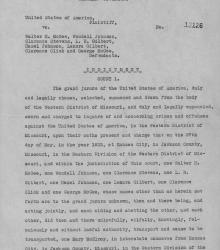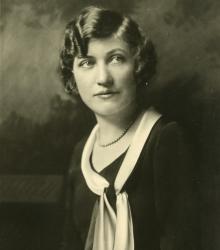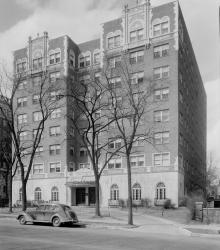Anonymous letter to Governor Lloyd C. Stark, describing ongoing corruption during elections, and making other accusations of misdeeds in Kansas City. The writer signs off anonymously, saying "am not signing my name for I rather live a while longer and you could have a leak in your office."
McElroy, Mary
Complaint for Criminal Case No. 12126: United States vs. Walter H. McGee, Wendell Johnson, Clarence Stevens, L. R. Gilbert, Hazel Johnson, Lenora Gilbert, Clarence Click, and George McGee, Defendants. In this document, Thomas J.
Warrant to Apprehend for Criminal Case No. 12126: United States vs. Walter H. McGee, Wendell Johnson, Clarence Stevens, L. R. Gilbert, Hazel Johnson, Lenora Gilbert, Clarence Click, and George McGee, Defendants.
Indictment for Criminal Case No. 12126: United States vs. Walter H. McGee, Wendell Johnson, Clarence Stevens, L. R. Gilbert, Hazel Johnson, Lenora Gilbert, Clarence Click, and George McGee, Defendants.
One of Kansas City's most sensational and ultimately tragic crimes began on May 27, 1933 with the kidnapping of Mary McElroy, the daughter of controversial city manager Henry F. McElroy, who had close ties to the political machine operated by “Boss” Tom Pendergast. She was released after 34 hours of captivity, following payment of a $30,000 ransom, but she never recovered from the emotional turmoil that ensued.
Nell Donnelly and her chauffeur, George Blair, were kidnapped on December 16, 1931. Donnelly had become famous after her 1916 founding of the Donnelly Garment Company, which sold stylish but affordable dresses for daily wear by ordinary women. Backed by the sales of “Nelly Don’s,” as the dresses became known, the company grew into a multi-million dollar business with over 1,000 employees in the 1920s.
Johnny Lazia (born Lazzio) gained prominence in Kansas City’s politics during the 1920s and ‘30s due to his leadership of the North Side Democratic Club, engagement in local organized crime, and involvement with Tom Pendergast’s political machine. Pendergast dominated Kansas City politics not by holding elected offices, but through his machine of alliances and affiliates.
Pages
- « first
- ‹ previous
- 1
- 2
- 3
- 4
